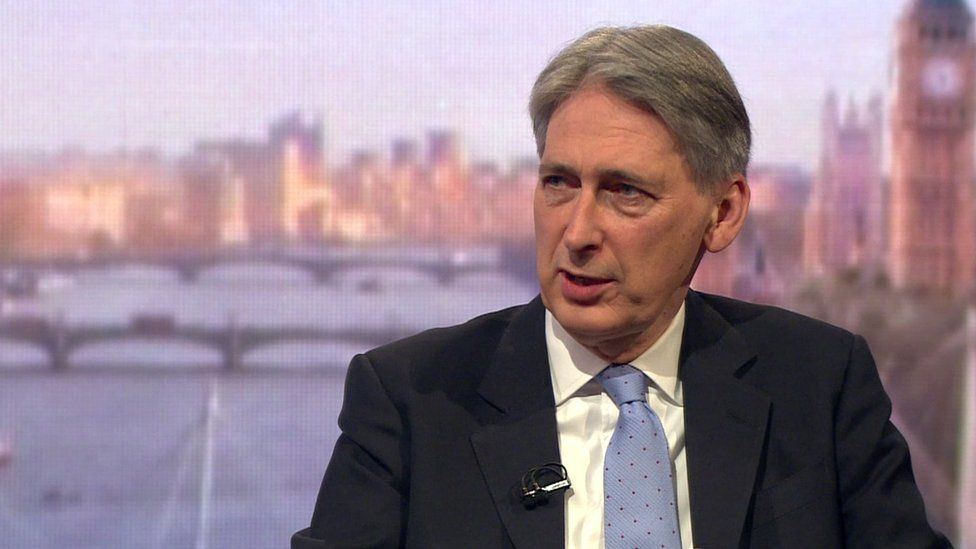EU talks will go down to the wire, says Philip Hammond
- Published

Foreign Secretary Philip Hammond says Britain needs a "robust deal" for staying in the EU, when European leaders meet at a summit on Thursday.
Prime Minister David Cameron is seeking EU reform before Britain votes in an in/out referendum before 2018.
"There are still a lot of moving parts," Mr Hammond told the BBC's Andrew Marr Show.
"We've got a negotiation that will run through this week and, I have no doubt, will run right to the wire."
Mr Hammond said the draft deal contains lots of "square brackets", "blanks" and "unclear language", but added a final agreement should provide "clear winds for Britain on national sovereignty".
'Step forward'
Mr Cameron has promised a referendum on whether Britain should remain in the EU by the end of 2017 but could bring the date forward if a deal is reached this week.
Among the four main changes Mr Cameron is trying to secure is limiting access to welfare benefits for EU migrants for their first four years in the country.
"Until a few weeks ago, people were telling us it was impossible to have any kind of period in which we treated newly arrived migrants differently from people who are already here," he said.
"But the text that's on the table recognises there can be a period of four years in which people are treated differently.
"That's a major step forward. What we have still got to discuss is what that difference in treatment precisely is... I don't think that is going to get resolved before Thursday."
Asked whether a one-year ban on in-work benefits for migrants would be enough to satisfy his party, Mr Hammond replied: "Definitely not."
He went on: "Getting agreement that we can treat new arrivals differently for a period of four years is a major breakthrough in challenging, as we have done, one of the sacred cows of European ideology."
Mr Hammond said the government was "still arguing" that treaty change would be the best way of cementing a new relationship with the EU.
But Mr Hammond said it was not essential, if European heads of government signed a binding agreement.
"Even if treaty change is agreed, it will be years before that treaty change comes into force," he said. "And once this [deal on Thursday] is agreed we need to see it implemented as quickly as possible."
Eurosceptic Labour MP Gisela Stuart said the EU project "was always deeper integration" and Mr Cameron had not been ambitious enough in the reforms he had sought over membership.
"The bar he set himself was exceptionally low," she told Marr.
"My instincts are this simply isn't good enough and won't serve the British people."
Ms Stuart said she thought voting in the referendum over whether to stay in the EU or leave would "not fall along party lines".
"We will go into the referendum with people coming from all sides and voting in pretty unpredictable ways," she said.
Russia accused over Syria
Asked about Syria, Mr Hammond accused Russia of "carpet bombing tactics" and carrying out "indiscriminate bombing of civilian areas".
Russia denies hitting civilians and has said it will continue its air attacks, which it says target only "terrorists".
On the future of Syrian President Bashar al-Assad, Mr Hammond said the key question was "whether the Russians are prepared to use their influence to remove him".
"There is one man on this planet who can end the civil war in Syria by making a phone call and that's President [Vladimir] Putin."
Mr Hammond said Russian air strikes were causing "attrition" among rebel groups but that the conflict overall was in "a bit of a stalemate".
Russian air power was forcing opposition forces to give ground but the Syrian government was unable to take and hold that territory, he added.
Mr Hammond said the number of "moderate" opposition fighters now stood at 150,000.
"I wouldn't call them all democratic," he said.
Russia has said other countries should join it in backing the Syrian government.
Mr Hammond's comments come after three days of talks among foreign ministers in Munich about prospects for peace in Syria.
BBC security correspondent Frank Gardner says that with President Assad and three mainstream rebel groups all vowing to carry on fighting, talks are "in practice, back where they started".
- Published13 February 2016
- Published12 February 2016
- Published12 February 2016